Rumor has it that Bing from Microsoft can really take your marketing and SEO efforts to a whole different level. Is it true though that Bing can be gold when it comes to better traffic to your website, increased ROI, affordable advertising, convertible exclusive visitors, and an overall friendlier search environment?
Given that we don’t lean on rumor, we figured out it’s best to check ourselves what’s there that makes Bing a smart target to marketers of all kinds.
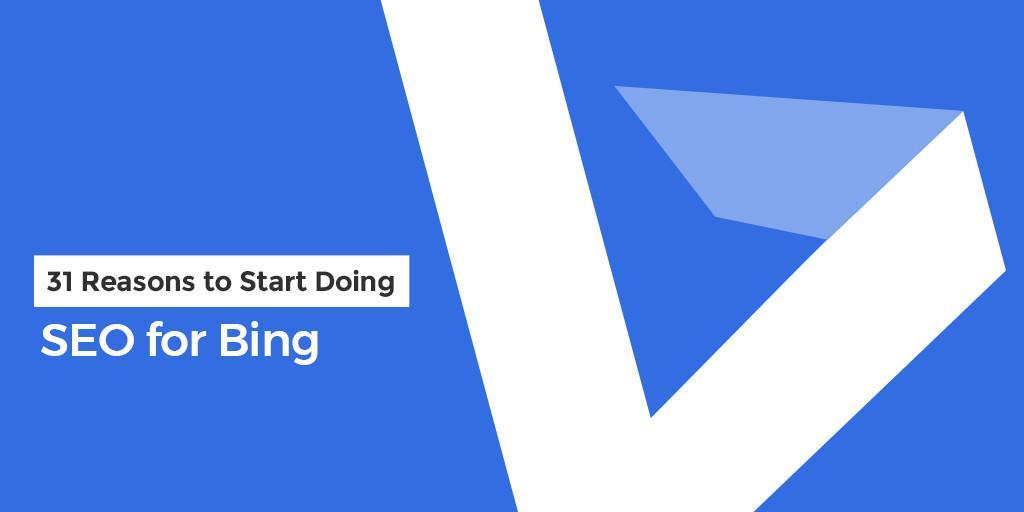
In a world full of Google-first mindsets, it’s wise to take a step back and reconsider our choices. Is Google the only medium worth investing into? We gathered 31 facts that prove that Bing might just be that missing piece in your overall online marketing strategy. Be ready to be amazed by statistics, testimonials, and webmaster-backed tips about Bing.
- Bing Traffic Might Have a Lower Bounce Rate
- Yahoo and Bing Own a Third of the U.S. Search Market
- Most Google SEO Practices Apply to Bing As Well
- Bing Has Lower Competition
- Bing Currently Powers Yahoo and the Majority of Voice Search
- Bing Is More Open About Their Ranking Factors Than Google
- Content is Not a #1 Ranking Signal
- On-Page SEO Matters More Than Off-page SEO
- Bing Has a Taste For the Good Old Practices
- Better Multimedia User Experience
- Social S1gnals Are a Vital Ranking Factor
- Bing Has a Stunning Array of Free Analysis Tools
- Content Needs to Be Top-Notch
- Backlinks: Numbers Talk
- Bing Teams Up With Google Against Shady SEO Practices
- Bing Prefers Older Websites to Newer Ones
- Meta Description and Keywords Impact CTR and Ranking
- EMDs Rank Higher on Bing SERPs Than on Google’s
- Bing Can Interpret Flash Websites
- Small Local Businesses Get a Boost in Bing’s Local Search Area
- Bing Is Gentler When It Comes to Mobile-Friendliness
- CTR Is a Turn-Point Ranking Factor
- Bing Is Very Secure For Authors
- Bing Puts Less Importance on Links Than Google
- HTTPS Is Not a Ranking Factor
- Bing Has a Simpler Penalty System
- Most of the Bing Audience Is Exclusive and Doesn’t Visit Google
- Bing Promises Increased ROI
- Bing Is a Much Cheaper Advertising Alternative to Google
- Bing Prefers 301 Redirects
- Microsoft’s Success Is One of the Finest Coups in History
- So How Can Microsoft’s Bing Change Your SEO Game?
In many ways, Bing is similar to Google. It provides a variety of search services, including web, video, image, and map search. As you’ve probably already seen in the table of contents, many optimization steps meant for Google also fit into the Bing world. And yet, we’re here to talk about what’s Bing offering to businesses and marketers that Google is not.
First things first, you should know why the Bing name. One idea struck me the other day and made me wonder whether the Microsoft team watched and worshiped the renowned sitcom tv-show “Friends” like everybody else on this Planet (well, almost everybody!). It would’ve been funny though if they got inspired by Chandler Bing’s name, especially when everybody in the show made fun of it.
However, let’s get back to our sheep and let you know that the Bing name was brainstormed and picked through focus groups. The proposed name pleased Microsoft for a number of reasons: it was easy to remember and spell, short, and friendly. It also reminded people the sound made when discovering something or deciding upon an idea. Qi Lu, president of Microsoft Online Services also said that Bing meant “very certain to respond/answer” in Chinese. Hey, I’m already sold!
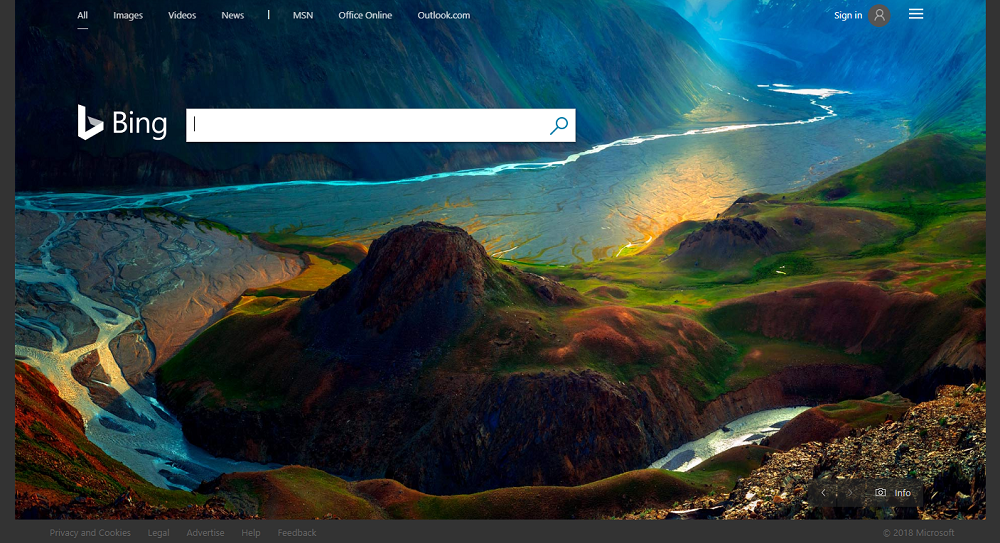
Should you be craving for some more proof regarding Bing’s performance and charm besides our 31-fact list, you should also check what people say about it and why they prefer Bing to Google. Here are some interviews deployed by TechRadar where working-class people explain how Bing’s a step forward for them when it comes to search engines.
Long story short, it’s time we listened to the founder and CEO of Market Domination Media, Jonathan Long’s advice and move forward and check what Bing has to offer to the SEO world.
| Stop treating the Yahoo Bing Network like the red-headed stepchild. | |
 |
jonathan long |
| Founder of Market Domination Media / @long | |
1. Bing Traffic Might Have a Lower Bounce Rate
Matthew Woodward’s experience with the Google and Bing traffic is very interesting. Although many say Bing doesn’t bring too many leads, Woodward experienced something else: this search engine provides lower bounce rate, more page visits, visitors spend more time on site, and there are more subscribers in general.

source: matthewwoodward.co.uk
Strong user engagement is very important for Bing and usually penalizes anything that’s not aligned with this requirement. There’s something similar to bounce rate but with an uglier truth – pogo-sticking. While bounce rates don’t always mean something bad, pogo-sticking always does. It occurs when somebody, after having shortly landed on your site, quickly hits the “back” button, returns to search results, and clicks on another website.
Another guess for the small bounce rate would be that, given the very precise search results aligned with Bing’s Webmaster Guidelines, people do get what they want most times they enter a query and spend enough time on site to satisfy their needs.
2. Yahoo and Bing Own a Third of the U.S. Search Market
The 2018 comScore stats revealed the new Bing search market status at both a global and country level. We’ll generally treat Yahoo as being an integral part of the Bing traffic, as they’re powered by the latter. Therefore, the combined strength of Bing and Yahoo nails around a third of the market share for search in the US.
Did we mention Bing is bigger than you think
? #SEM #PPC #bingadswebcast pic.twitter.com/jeJxJGcxl5
— Bing Ads (@BingAds) August 17, 2017
Although Google’s traffic is double, we’re still talking big numbers and users that are active on a search engine that surprisingly is other than Google. Given the ton of search done on Bing, it’s very important for digital marketers to know what they’re missing out when struggling to rank on the first Google pages. This way you’ll know where to start optimizing your website, preferably with as little effort as possible.
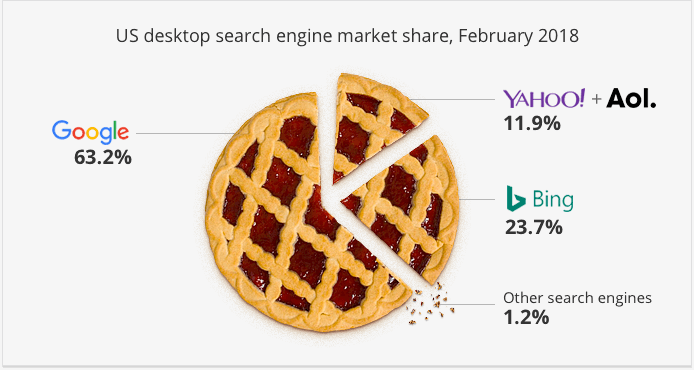
source: link-assistant.com
We all know that most times, numbers talk.
Imagine that you could be missing 143 million unique searchers each month and 5.2 billion searches a month probably don’t display your website in SERPs.
Pretty tough, isn’t it? To rub some more salt into the wound, financial and automotive queries on Bing and Yahoo is triple to that of Google, counting up to 11 million out of a 14 million total.
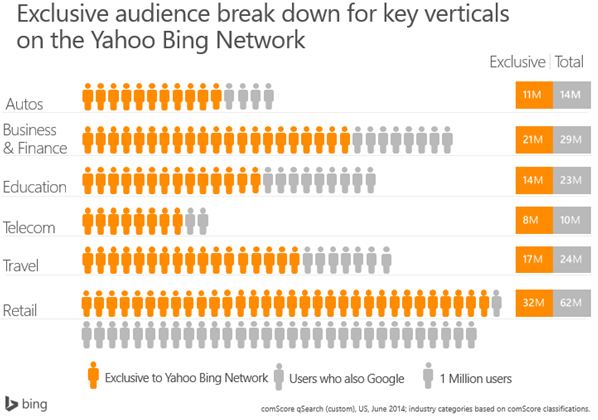
source: searchenginewatch.com
3. Most Google SEO Practices Apply to Bing As Well
There are two sides when it comes to the theory that says if you rank high on Google, you rank well pretty well on Bing too. Most agree with this, although with a critical eye, but others are reluctant and argue that search algorithms are different, hence searching for the same query won’t provide you the same SERPs but a quite different one.
Either way, we can’t deny the fact that Google and Bing share many similarities, while most guidelines provided from webmasters working for the former are listed as important by webmasters from the latter as well. Nobody says that if you’re on page 1 on Google you MUST be ranking on the same page for the same query on Bing as well.
It’s just that you actually don’t need to reinvent the wheel with Bing but only consider some retouches.
Again, although their algorithms are somehow different, you can easily target Bing for ranking your website high. SEO for Bing is not so different from Google – you could easily get the best of both worlds. What’s more, most SEO efforts meant for Google will also translate well with Bing and Yahoo as well, given that the latter is powered by the former.
Both Google and Bing value relevant content, look for well-placed keywords, place big brands higher, ask for mobile-friendliness and unique user experience, correlate social signals with quality content and better rankings, consider backlinks very important for websites, require the on-page SEO to be up-to-date, and have similar search layouts. Moreover, all three major search engines, Google, Bing, and Yahoo, allied and signed an agreement to make search listings richer and more accurate through structured data.
Should you decide to start optimizing for Bing, it would be wise if you checked what impact those tactics might have on your Google ranking, so that you’ll avoid losing popularity and the lead for a search engine with the biggest market share of all.
4. Bing Has Lower Competition
Reading various comments on this Bing topic, I noticed there are very few to no people doing SEO for Bing, mostly because they already rank pretty high inside the search engine or simply have no interest in it. Truth be told, the majority of websites focus only on optimizing for Google, leaving the other search engines behind, hence unconsciously allowing Bing develop a fertile search environment where there’s not much of a competition and brands could easily rank high.
Bing is second in line after Google when it comes to marketer’s best practices given that everybody struggles to please the bigger master, but it could really add some value to your strategy.
Moreover, taking the nearly two decades into account in which SEOs have purely focused all their efforts on ranking high on Google, it’s hard for newcomers to compete with people who already forged their skills for years in a row. But now there’s a new land for people to sow their brands into and see them grow and thrive. Targeting Google is the right move and there’s nothing to blame, as Sherry Bonelli would say. But you should at least be aware of what Bing might do for you.
| If you’re guilty of “Google-first”, it’s not without reason. | |
 |
sherry Bonelli |
| Digital Marketing Guru at Early Bird Digital Marketing / @sherrybonelli | |
5. Bing Currently Powers Yahoo and the Majority of Voice Search
For many years now, beginning July 2009, to be exact, Yahoo search has been powered by Bing meaning that the former’s searches are backed by Bing’s index and ranking algorithm. Should you doubt, just do a test search and see for yourself that search results are very similar. Hence, optimizing for one should please the other as well, at least when looking at the bigger picture.
Furthermore, should be a little behind with news, Oath is the new name for the Yahoo+AOL mix that came into effect after Yahoo was purchased by Verizon in 2017, including TechCrunch, hence you’ll often see this name in the charts that will follow shortly.
One of my biggest surprises was to find out that Bing also powers the Siri voice search feature on people’s iPhones. To all the Siri users and aficionados out there – you are using Bing and have no clue about it yet.
6. Bing Is More Open About Their Ranking Factors Than Google
Although Bing offers users guidelines as to how they should optimize their websites, Bing specifies that this is not going to guarantee higher rankings or more traffic from the search engine, although it’s wise to tick them on your list nevertheless. This shows you should expect contingencies but they’re ready to guide you through and, when necessary, tell you the naked truth.
Bing is much more transparent about ranking factors; just check their Bing Webmaster Guidelines and case studies and you’ll agree. Plus, they give you the tools to beautify your website to their taste, hence little to no hidden strings.
Interesting enough, there’s yet no evidence as to what Bing values most when it comes to ranking – links, content or anything else. They do value quality content but they don’t specifically say links or content play a major role as Google uses to.
7. Content is Not a #1 Ranking Signal
As previously said, content is rendered neither as #1 ranking signal on Bing nor as a part of the privileged few that are part of the top. As long as it has the three pillars of content quality, they’re happy.

source: Bing Webmaster Guidelines
Bing knows how they like their content in order to rank it high, but there’s one element that might make your page contents more appealing: multimedia files.
Bing looks for rich and engaging content, one that uses spot-on images, video, audio, so on and so forth.
8. On-Page SEO Matters More Than Off-page SEO
On-page SEO is king on Bing. This is what reigns the Bing lands, while off-page follows next. Although digital marketers invest time, money, and effort into both, it’s a universally known fact that successful off-page SEO only follows good on-page SEO.
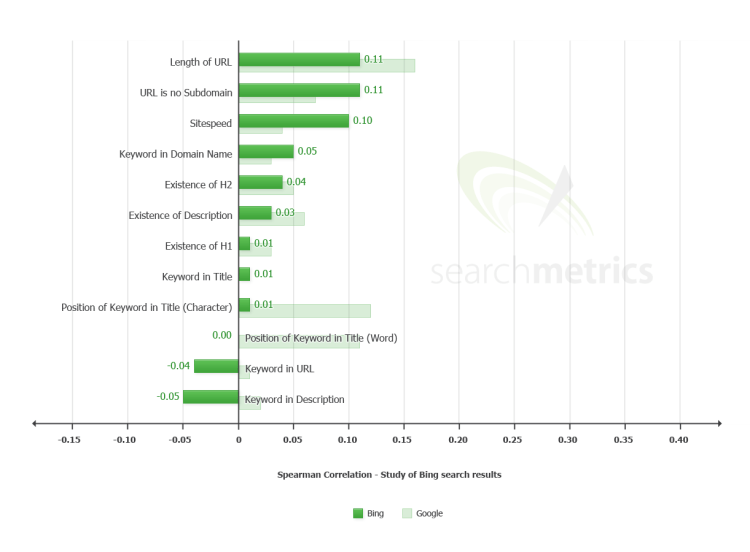
source: searchmetrics.com
Therefore, Bing is not cherry-picking the best one out of two but only gives on-site SEO its well-deserved tribute. To some extent, it’s a chicken-or-the-egg type of debate.
9. Bing Has a Taste For the Good Old Practices
Unlike Google who’s always updating everything, Bing is more into the classic. Generally speaking, what’s new-school for Bing is somehow old-school for Google.
Bing has a rather tangled search algorithm, one that is focused on things such as exact-match domains and keywords in headings, titles, copy or meta description (although Google dismissed them as a ranking factor, Bing relies on them), or high-quality content – authority, display, multimedia, relevance. Those who are fond of the old Google interface and ranking factors could easily feel at home when using Bing.
| As we optimized specifically for Bing and Yahoo, I felt like I was optimizing for Google a few years ago. Tactics and tasks that were significant to me years ago, were now a factor again, just on different search engines. | |
 |
william kammer |
| Director of SEO at Levy Online / @williamkammer | |
10. Better Multimedia User Experience
Bing has a better entity understanding in regard to multimedia and considers it a big plus if added to text content. Therefore, the Microsoft search engine uses it as a ranking factor which they also signal in their Bing Webmaster Guidelines.
Another good thing would be that Bing is more user-friendly when queries ask for images. The search engine gives exact search results without related searches or suggestions of this kind, as Google visitors are used to.
So you can get Bing’s favorite should you provide nice and tidy, unique, high-quality, and relevant images.
11. Social Signals Are a Vital Ranking Factor
According to Neil Patel, Bing
Bing says social signals pass on influence at alll levels, especially to brands’ social channels and to search engines.
Their impact should really mean that marketers should put an emphasis on increasing their social media audience and receive some feedback.
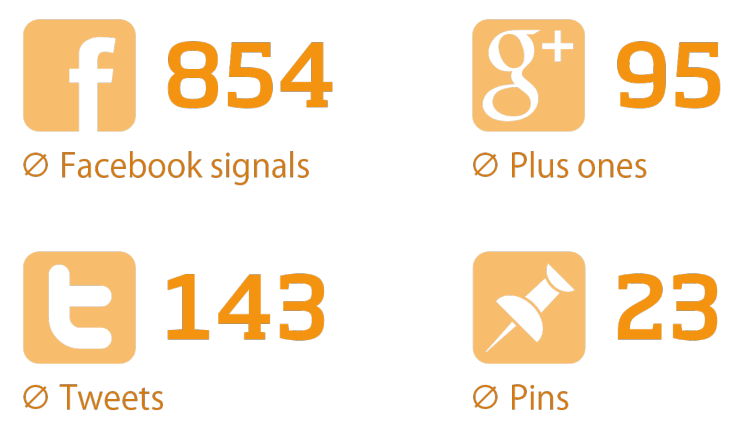
source: searchmetrics.com
As expected, Bing too is against fake social media followers and engagement, such as it is against keyword stuffing when it comes to relevant content.
Although Google doesn’t say anything regarding the power of social signals, they greatly influence your rankings and many experts and SEO gurus vouched for them, so it’s wise to use them and benefit from both search engines, Google and Bing.
12. Bing Has a Stunning Array of Free Analysis Tools
Be it on the link level, the site structure level, or the page level, Bing has it all. Plus, Bing Webmaster Tools are free and provide actionable insight and tips on how to optimize your website for them.
Matthew Woodward thinks they’re superb and encourages marketers to use it right away. It’s like Bing has concentrated all marketing superpowers in one toolset and now lends it for free for people to learn what’s worth and what’s not in Bing’s eyes.

source: matthewwoodward.co.uk
Bing is definitely SEO-friendly. One look at their in-depth structured Webmaster Guidelines, Tools, and case-studies, all there in order to make the search engine a better and easier-to-live-in place.
Bing provides the right means to sign up your website for analysis – be they backlinks, keywords, link profile etc -, mobile friendliness -, find out whether you’re penalized or not, even get your SEO reports that point out the flaws they see when crawling your site.
13. Content Needs to Be Top-Notch
As previously said, content is not a ranking content per se but it’s still important how it looks and “displays itself” on the internet. They prefer unique content, content written by professionals from well-known sources or people with field expertise instead of recycled content which is widely available everywhere on the web.
The Bing Webmaster Guidelines defines optimized content as: “clear, easy to understand and scan, deep, without ads, without affiliate links or redirecting readers to other links shortly after they landed on their page, should be friendly, easy to navigate, engaging, information-rich”.
Content should be multimedia-rich, with graphs, images, and videos meant to engage and offer all the necessary information to the reader. Generally, Bing places a higher value on in-depth, unique, long and engaging content rather than on shorter content. Bing is pretty simple to understand and follow – all you need is to know what you need and the search engine will provide it for you.
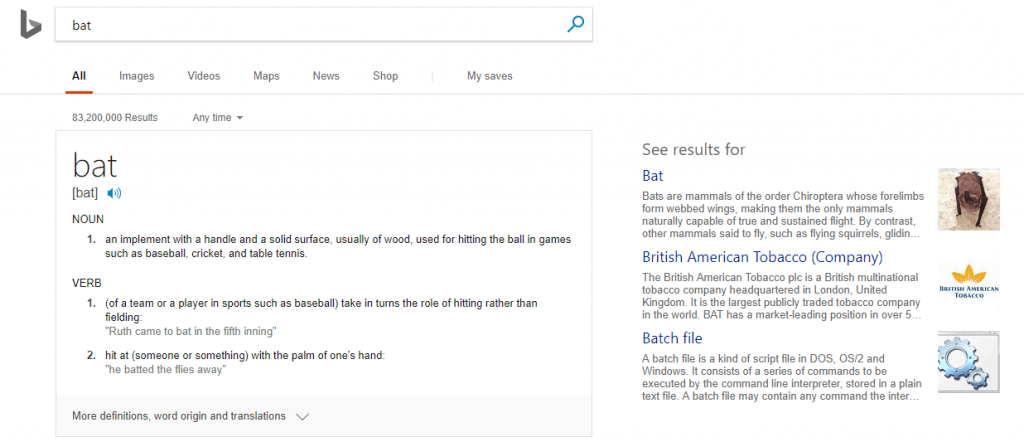
14. Backlinks: Numbers Talk
The number is so important that it can even beat the link quality.
Although it’s possible for Bing to look more to quantity than to quality, to some extent, it does prefer the ones coming from highly-authoritative websites, usually ranking .edu, .gov, .org sites higher.
This might be one explanation as to why Bing ranks older, hence richer in links and social activity, websites. Similar to Google, the search engine from Microsoft prefers organic links from relevant, trustworthy websites that vouch for the traffic they lead to your page and old – as age is a sign of trust and influence. Should the backlinks be do-follow and with exact match anchor text (contain your target keywords), you win the jackpot.
The Bing team says on their Webmaster Guidelines page that links are necessary to help them spot new pages on your site, as they don’t crawl all your pages, but only the 10 most influential ones. Links show you’re popular, trustworthy, and relevant to real users who eventually generate organic and continuously increasing traffic.
15. Bing Teams Up With Google Against Shady SEO Practices
Link schemes, cloaking, social media schemes, reciprocal or paid links, duplicate content, overly advertised pages, quality over quantity content, misleading markup, link farms, and excessive link manipulation, in general, are not welcomed on Bing.

source: Bing Webmaster Guidelines
Therefore, all the white hat SEOs out there searching for a safe place to develop their brand in the online market, Bing is one of the places-to-be.
16. Bing Prefers Older Websites to Newer Ones
I know this one tells a different tale compared to what Google values most, but Bing is old-school and likes to deal with websites that have aged beautifully and you can easily put your trust in.
This is genuinely because Bing looks at site authority when checking backlinks or websites, in general. Having a “vintage” (old) domains helps. Older websites have a story to tell, and more often than not they engage in healthy digital marketing practices and have build a trustworthy name in their niche.
Bing though everything through, isn’t it?
17. Meta Description and Keywords Impact CTR and Ranking
This is an old debate where search engine officials state they don’t use metadata as a ranking factor, however, when optimizing your website with meta keywords and description, brands seem to send another vibe to both search engines and readers.
Although Duane Forrester from Bing Webmaster Outreach announced they don’t take metadata (keywords and descriptions) into account when ranking websites, quality research (testing and experience) show something else.
| A client came to us with good Google ranks, but very poor Yahoo and Bing. This caused us to look deeply into specific optimization techniques for Bing and Yahoo. One of the first things we noticed was the lack of meta keywords and descriptions. Once we completed filling these out, we saw noticeable increases across the SERPs (except Google). | |
 |
william kammer |
| Director of SEO at Levy Online / @williamkammer | |
Either way, Bing needs meta keywords and description to position you higher and understand your content better, while it also helps Google users have a better understanding of your provided info, if not the search engine. Although Google say they don’t use metadata for ranking, it’s still important to optimize your pages with them given the overall impact on CTR.
18. EMDs Rank Higher on Bing SERPs Than on Google’s
Bing is not very good at grasping the meaning from the context, it needs the stuff to be already chewed. As a consequence, Bing puts more emphasis on the exact match anchor text as compared to Google.
Although Google is somehow against exact-match settings knowing that many spammy websites use exact-match domains, it’s a bit risky to optimize your website this way, should you want to rank high on both search engines. Think of all those online movie websites that wear a domain name matching the very query – “watchmoviesfree”, “tvmovies”, “freemoviescinema” etc.
However, given that in the Bing world exact match keywords in your domain name matter, you should try to incorporate it naturally. This is one of the perks of optimizing your website for Bing – exact-match domains get lucky here.
| Bing has lots of EMD sites ranking before some act
|
|
 |
william kammer |
| Director of SEO at Levy Online / @williamkammer | |
Should you want to have yet another shot at ranking higher on Bing, you should focus on exact-match domains in the title, description, HTML, headings, and copy.
19. Bing Can Interpret Flash Websites
Long story short, Bing can interpret flash websites, while Google Chrome has a rather difficult time with them.
20. Small Local Businesses Get a Boost in Bing’s Local Search Area
Local businesses will rejoice when hearing this: it’s easier to get increased local visibility with Bing.
The issue is twofold: first, Google generally favors the bigger local businesses when compared to Bing, secondly, the former often times misses the point when delivering results to a query because it uses contextual clues to figure out what you’re really searching for, whereas Bing will show your local results first.
Moreover, brick-and-mortar businesses have a better shot at being visible on Bing than on Google with the Bing Places for Business.
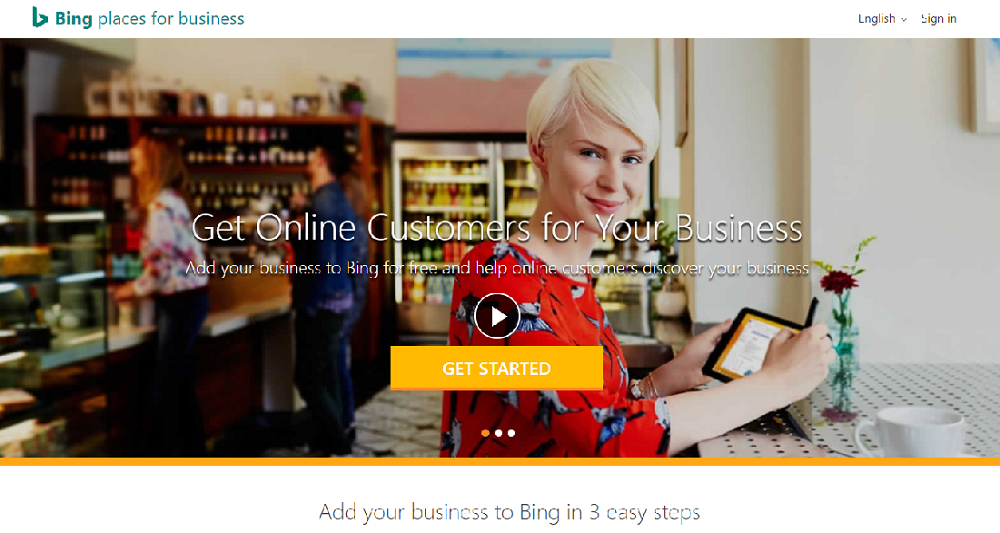
All you need for Bing’s free local listing service is your physical address, contact info, opening hours, your website link, and nice photos of your business. In addition, Bing provides users a feature Google is missing at the moment: an agency dashboard feature to help users run local search campaigns easier and at a quicker pace.
21. Bing Is Gentler When It Comes to Mobile-Friendliness
Bing values mobile-friendliness set-ups but has a different approach to it. They consider mobile-optimization a plus in ranking higher in SERPs, while Google made it rather mandatory, saying they will start ranking you based on your mobile website first.
22. CTR Is a Turn-Point Ranking Factor
This is a simple calculus. As you probably figured out already, Bing likes things easy and tidy. Imagine two websites ranking on #1 position and #2, respectively. They’re both performing exquisitely, yet #1 position has lower CTR compared to the one on the second place. Guess what: there’s going to be a switch.
23. Bing Is Very Secure For Authors
We already talked about Bing preferring authoritative websites with some history on the web. They’re willing to offer the same sense of security to content authors as well.
With Google providing people with the chance of claiming content they have written, Bing also had a “Klout-orship” program which provided author details such as Linkedin summary, social profiles, Klout score, 2 most popular posts from Twitter in the last 7 days and 2 most engaging posts from Instagram in the past 90 days. However, not until recently we have learned that Klout has unfortunately reached an end on May 25, 2018, Lithium announcing that “Klout is now kaput“. Wonder what Bing will do next…
Anyways, Bing is quite strict when it comes to website authority and trust, hence they will continue taking into account a variety of factors such as social signals, name recognition, cited sources, the author’s identity and more.
24. Bing Puts Less Importance on Links Than Google
Matthew Woodward said that Bing puts less importance on links when compared to Google, although it does favor editorial links coming from websites with high-quality content and top-notch marketing tactics.
It’s the same debate as the one with content: content is very important, as links are too, but they are not rendered as a top ranking factor with Bing.
25. HTTPS Is Not a Ranking Factor
This fact is backed by Bing Lead Program Manager Vincent Wehren. Whilst for Google it is a ranking factor, Bing considers it irrelevant for website positioning and they are not going to give it any credit.
26. Bing Has a Simpler Penalty System
Besides being quite transparent about it’s ranking algorithm, Bing also doesn’t name a vast array of penalties, except the one where they delist a website when shady SEO practices are noticed in their behalf. And it’s very easy to find out whether you’ve been penalized in their Webmaster Tools area.
| We don’t know a whole lot about Bing’s penalties but what we do know for sure is they are a much friendlier beast than Google. | |
 |
matthew woodward |
| Award Winning Blogger matthewwoodward.co.uk / @MattWoodwardUK | |
27. Most of the Bing Audience Is Exclusive and Doesn’t Visit Google
In 2014, comScore published some statistics that might surprise you. In addition, they will help you draw a better picture of these unknown figures who seem to slip through your fingers.
According to the stats, the Bing searchers seem to be college graduates and graduate school students and mature people fitting the 35+ age group. Women represent a slightly bigger figure than men, most of them managing households with children. What’s more, these households have incomes more than $75.000.
Bing’s demographic is more mature in age and affords to spend more money.
72% finance and business searches happening on Bing and Yahoo are not to be found on Google’s ground. This is almost 21 million people you might be missing in finance, and that’s tough, as they are the ones holding the biggest share of the money, aren’t they?
Curious though why they keep their searches exclusive and don’t check all search engines for what they’re interested in. Could it be that Bing focuses on older and more authoritative and trustworthy brand websites?
28. Bing Promises Increased ROI
ROI is vital to digital marketing and Bing can double it or even more. According to comScore, Yahoo Bing Network traffic converts better, spending 6.8% more money online than the one searching on Google.
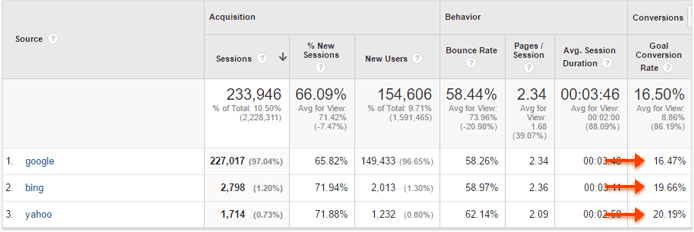
Source: link-assistant.com
Given that usually on Google it can take up to 12 months in order to get your payoff from your SEO efforts on their site, you should also consider Bing. Thanks to the lower competition for page one, it takes less time to see results on your investment. And this is splendid news especially for smaller companies who have a more fragile budget plan and smaller chances of seeing some decent ROI on their SEO efforts. All in one, Bing might have a better conversion rate than Google.

Source: matthewwoodward.co.uk
29. Bing Is a Much Cheaper Advertising Alternative to Google
Thanks to the lower competition available on Bing, it is cheaper for PPC advertisers to place their mobile and desktop ads. You can check the exact 2017 paid search trends on iProspect.
With Bing, you can afford both to advertise on and optimize for it.
30. Bing Prefers 301 Redirects
Bing prefers to use 301 redirects (sending people to a permanent location) instead of 302 ones. Their latest Bing Webmasters Guidelines update tells 302 redirects are fine, although, in reality, they still don’t work as they should. Normally, they wouldn’t recognize a 302 eredirect but after the crawlers would hit it multiple time, Bing would turn it into a 301.
Canonical tags instad of a proper redirect are not welcome either. Same with meta refresh redirects.
31. Microsoft’s Success Is One of the Finest Coups in History
Experts call it the Big Bing. In 2014 Mozilla released version 34 of their Firefox browser and made a move that changed the history: they removed Google as the default search engine and changed it to Yahoo! For North America, also replacing it with other search engines for Russia and other neighboring countries.
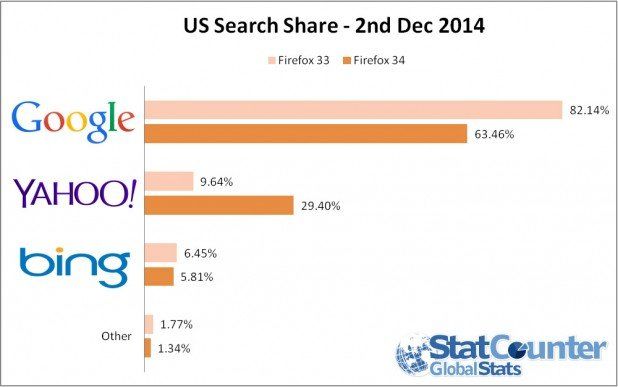
And boom! search traffic numbers changed for good in only 24 hours. Is this bad or good luck? It depends whom we’re looking at. Plus, imagine that many people (especially the older ones) don’t really care what search engine they’re using as long as they get answers to their queries, hence still use Bing from the day they purchased their laptop up till today. Here is the search engine’s success story in a nutshell, told by Tom McKay.

source: gizmodo.com
Either way, Bing is bigger than most of us think. On August 17, 2017, Bing tweeted their search market share across major countries around the globe and the statistics are stunning.
Bing is bigger than you think! #SEM #PPC #bingadswebcast pic.twitter.com/fFtEDvM634
— Bing Ads (@BingAds) August 17, 2017
So How Can Microsoft’s Bing Change Your SEO Game?
It was high time we shedded some light on Bing. Even our blog craved for some words of wisdom regarding this search engine few (or so many, it depends on the perspective) turn to.
Let’s apply Dan Petrovic’s technique of ending a talk on a topic: “When you do a talk, tell them what you’re gonna tell them, then tell them, and then tell them what you told them“. Remember that Bing:
- has lower competition
- has lower bounce rate, more page visits, more time-on-site, more subscribers
- is much friendlier than Google in terms of ranking signals and penalties
- has no top ranking signal
- considers social signals a ranking signal
- has great free analysis tools
- needs meta data to rank you high
- EMDs rank higher than on Google
- it hasnearly a third of the search market share (US) together with Yahoo
- powers Yahoo and Siri web search
- increases local businesses visibility
- has a bigger ROI
- is a cheaper advertising alternative to Google
As Dan Petrovic said in one of our cognitiveSEO Talks: On Search and Traffic podcasts, we need to see a third search engine come up with something different, not just be a few years behind Google, and act as a fully revolutionary search engine.
| What I would love to see is one proper competitor to Google, whether it’d be Amazon, or eBay, or a new search engine, or even Facebook. I’d love to see a proper competitor in terms of information retrieval and presentation to users. […] I think there needs to be good competition, and that’s a good thing for Google and a good thing for users if there’s proper competition to Google, so they’re not driven just by their shareholders but by pure competition. | |
 |
dan petrovic |
| Search Marketer dejanseo.com.au / @dejanseo | |
Bing is one of the three search engines that rule the world wide web (www). Many know it for having surpassed Yahoo in both traffic numbers and success, most of them assuming that Bing’s younger than Yahoo on the search market.
However, even to my own surprise, Bing is a search engine created and operated by Microsoft, one that has replaced in 2009 the former Live Search (2007), Windows Live Search (2006), and MSN Search (1998) Microsoft engines. It seems like Bing’s the Big Brother who’s been always here watching us without us knowing it.
Hopefully, you have a better picture as to why you should let Bing play an important role in your SEO strategy.
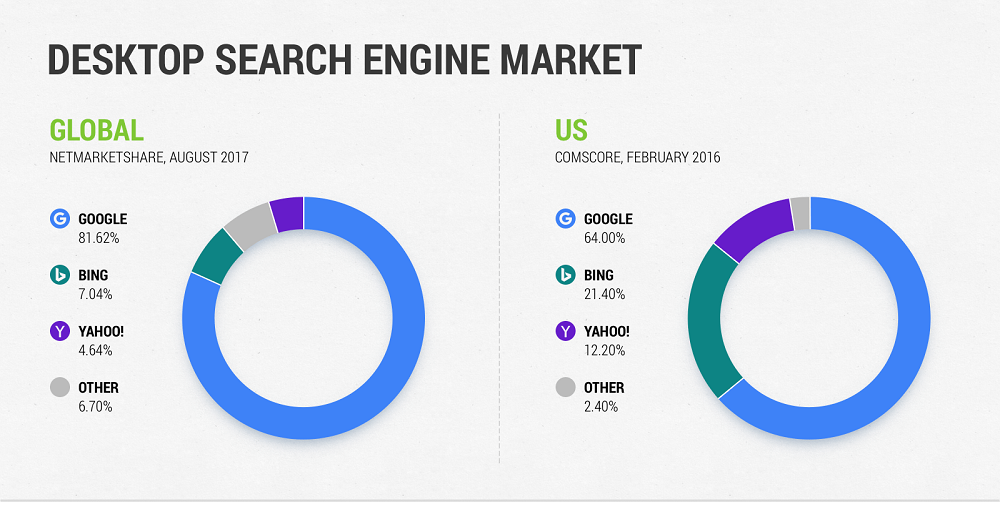
source: searchenginejournal.com
The post 31 Reasons to Start Doing SEO for Bing appeared first on SEO Blog | cognitiveSEO Blog on SEO Tactics & Strategies.
31 Reasons to Start Doing SEO for Bing posted first on http://nickpontemarketing.tumblr.com/
No comments:
Post a Comment